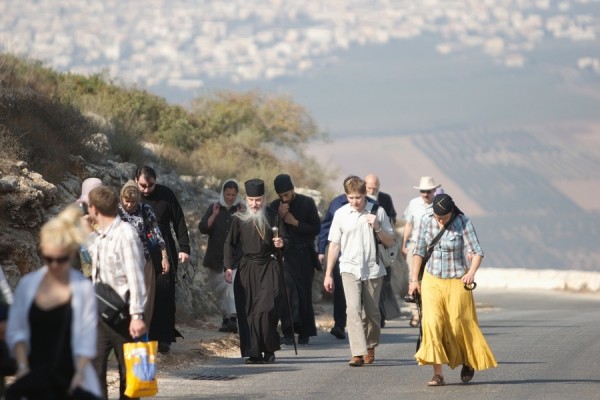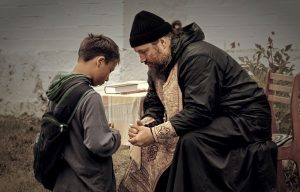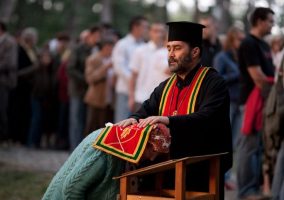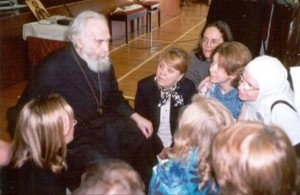In an on-going discussion with my inquiring friend today, I respond to two questions. First, why do traditional Christians call priests father; and second, why do we pray to saints (i.e. why don’t we just go to God ourselves)? My friend is familiar with contemporary Charismatic Protestant Christianity, so I refer to this below.
You know, both those questions are related in many ways. Today we are such individualists that it is hard for us even to imagine what St. Paul is talking about when he describes the Church as one body with parts completely dependent on one another. We all imagine that each (relatively healthy, normal) person has access to the same knowledge of God and spiritual things, that we really don’t have to depend on others to know God well. This is the way that our culture has taught us to think—you can trace the philosophical development of this way of thinking back to a guy named Immanuel Kant (died 1804) who argued that if something is true/reasonable/real it must be true/reasonable/real for everyone. This way of thinking is called “modern,” which means it comes from the Enlightenment thinkers of Europe. We have begun to enter a “post-modern” age, so some of these assumptions about knowledge, especially spiritual knowledge, are starting to be challenged by the broader society; but still Evangelical, Protestant Christianity as we know it today is indelibly stamped by the Enlightenment, so many Protestant understandings of how one relates to God are extremely individualistic. But pre-modern Christian understandings of how one relates to God were much more communal.
Take, for example, St. Paul. His understanding of his relationship with his spiritual children is that of father and child. He calls St. Timothy his son (2 Tim. 1:2) and argues to the Corinthians that because he “begot” them in the faith, he is their “father” and thus they should listen to him (1 Cor. 4 :15). Furthermore, St. Paul is continually asking for the prayers of those to whom he writes, and he is continually assuring them that he is praying for them. In the pre-modern Christian world, this made sense. It made sense that one’s spiritual parent (father or mother as the case may be) would pray for you and that without those prayers, you would not be able to grow or be protected from spiritual enemies. And so, with that mental mindset, to call someone father was to say that in some way this person is an icon or representative of the Father. Or we might say that the one we call father is someone who brings the Heavenly Father to us and/or us to the Heavenly Father. The same principle applies to “teacher,” “master,” or “doctor” (which is Latin for teacher). There is only one Teacher, God (Who is also the One Father and the one Master). But God has so set up His Body, the Church, that God teaches through human teachers. And so to call a human being a teacher is to say that this human teacher brings us something from, or brings us in some way to, the heavenly Teacher. Now, since the gifts and callings of God are without repentance (that is, they never go away), and since no one in Christ—even if he has died—is dead, for all live in Christ, it has been the practice of the Church since the very beginning for spiritual sons and daughters to continue to look to their fathers, mothers and teachers in Christ for guidance, help and prayers. Of course we all can and do go to God ourselves, but why wouldn’t we also want the prayers of holy men and women who have demonstrated through the holiness of their lives and many manifestations of Grace that they are gifted and called by God to teach, heal, guide and in various ways help those who are still beginners in the spiritual life?
In fact, when we think we are going to Christ ourselves, we may be suffering from a kind of delusion and not know it—which is what makes it a delusion. The delusion is that I am able to discern myself what God is saying to me or what God is doing around me. It’s a delusion because we completely ignore the fact that we have been wrong so many times; it is a delusion because our criteria for being right, for knowing that we hear God, is based solely on our subjective experience—even if that subjective experience also includes some miraculous events, manifestations or experiences. Jesus gives a very frightening warning when he says in the Gospels (more than once) that at the judgement on the Last Day many will claim to have known Him based on the fact that they prophesied or did “mighty acts” in His name, but He will say of them that He never knew them. The Fathers and Mothers of the church warn us again and again of the dangers self-guided spirituality. It has been said many times that he who is his own spiritual guide has a fool as a spiritual guide.
There is another aspect to this too: humility. It is difficult to even begin to acquire humility when one is making all of his or her own spiritual decisions. Sure, “I’m being led by the Spirit” we say, but I am the one who decides what the Spirit is saying and how it is to be interpreted and applied: I’m still in charge. And when, in God’s graciousness, I do experience some miraculous guidance or powerful manifestation, I may say that it is all God’s work, but at some level in my mind what is “all God” depends a great deal on me—what I discern, what I sense, what I see or feel. This is why many traditional Christians are not comfortable with the way contemporary Charismatics talk about and teach spiritual gifts and how one experiences and functions in them. I realize that many Charismatics are good people, even holy people doing their best to teach based on their own experience and understanding of the scripture. But from the perspective of pre-modern Christianity, much of this seems to be a recipe for manipulation and delusion leading to spiritual pride or self sufficiency, as though “me and the Holy Spirit” were enough. But that’s exactly the opposite of the teaching of the New Testament and of all Christianity until relatively recently (historically speaking). No, we need the prayers, the guidance and the teaching of the whole body, and if I experience any personal success or guidance or miraculous manifestation, it is because of the prayers of my spiritual father, my spiritual children, my guardian angel, and/or of all of the saints who are watching and praying for me. But when I fail, or miss the mark, or think God is saying one thing when it becomes evident He isn’t, then that is because I have relied on my own discernment, my own ability to hear or know or understand.
It is very hard for contemporary Evangelicals and Charismatics to “get” this idea. However, the general cultural trend to post-modern thinking is helping a little. For example, you have heard of the theory that when a butterfly flaps its wings in one part of the world, it can lead to a thunderstorm in another part of the world (that is, the world is connected in ways we don’t understand). Also, we are learning that all living things are connected in ways that cannot be explained by mere biology, and that very small things (atoms) and very large things (galaxies) function according to rules that just don’t apply to the physical reality in the middle. This post-modern way of thinking has led to a reconsideration of the wisdom of the “elders” in pre-modern societies and an understanding that the individualistic, scientific, merely rational, way of looking reality just doesn’t work in many areas of human experience—especially when it comes to human relationships and spirituality. Of course the down side to this has been that “modern” Christianity is seen largely as a bad guy, because it is associated with all of the atrocities and stupidity of European expansion and colonialism of the past 300 or 400 years.** But Orthodoxy is not modern Christianity. It is pre-modern. It assumes that it takes a “village” to raise a Christian. And not just a village of people who live in the same time and place, but a village that includes all of our holy Fathers and Mothers who have gone before us.
When we come to God, we come with everyone, never by ourselves. It is instructive to look at the depictions of heaven in the book of Revelation. Heaven is a very crowded place. There is no “just Jesus and me” in heaven. There are ranks of angels and martyrs and elders and a “sea” of every tribe and tongue. I think as products of modernity, our concept of God is way too small. We cannot somehow imagine a God who can be intimate with me as part of us. We fear that somehow I will be lost if I am included in us, if I am part of us, if I need us. We are afraid, I think, of something like the Star Trek image of the Borg, that we will lose our personhood if we are part of a whole. But it is not like that. Just as the one God exists as three Persons, so too human beings were created to be wholly our personal selves only as we are one with the body of all who are in Christ. God is our Father, and we are his children. God is our husband and we are his wife. God is our head, and we are his body. God’s relationship with each of us is intimate and personal, but it is with me as I am dependent on and organically connected to us altogether. We are connected—connected to God and to each other. The relationship with God is only with me as I am part of us—not an autonomous part (like a bolt in a machine), but an organic part (like a kidney in my body) in which the life of every part flows through every other part.
And so, to call someone father or teacher is only to acknowledge that our one Father and Teacher comes to us in and through men and women who are fathers/mothers and teachers to us, bringing us to the one Father and Teacher. Similarly, to pray to and with the saints is to acknowledge that I am not alone, that I cannot be alone and be in God at the same time. Mothers and fathers and teachers who are yet in this temporary life pray for me, help me, and guide me to Christ; and they continue to pray for me, help me and guide me to Christ after they have left this fallen world. The only difference is that now in heaven they are no longer wearied by the flesh or distracted by passions or limited by their own short comings. They are in Christ fully now, so wherever Christ is, they are; whatever Christ is doing, they are doing in Him.
**Not that all the atrocities and stupidity of this period are the fault of Christianity (modern or otherwise), and—even more importantly—many of the advances in medicine and human rights and care for the marginalized, which were directly the product of Christian thinking and motivation, get cut off from their Christian roots in the contemporary telling of their origins.




















